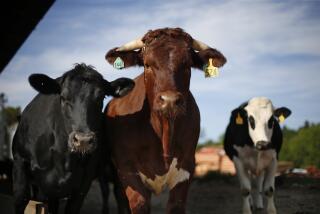Scare Tactics Used to Discuss Biotechnology
- Share via
Critics may “fear health dangers and an ecosystem changed forever,” but your article, “Biotech Soybeans Plant Seed of Risky Revolution” (July 1), does not present evidence validating this fear. While there may be controversy on a financial front regarding farmers’ purchase of seed or use of pesticides, the genetically altered soybeans themselves do not appear to be dangerous to our health or safety by any measure.
Why would such a reputable newspaper use inflated words and scare tactics to discuss such a topic? Perhaps it is a “wildly successful marketing ploy.” It is also highly irresponsible.
Janet Dreyer
Pasadena
Monsanto asks the question: How can we modify plants to withstand the toxic chemicals of Roundup? It is answered by altering the DNA of the soybeans that will be eaten by almost all of us. It will change the soil composition with equally unknown consequences. The consequences cannot even be conceived. This is not even addressing the possibility that those chemicals will find their way into the water supply.
An environmentalist might ask: How can farming procedures be changed so that chemicals will not be needed? Pest management was achieved by simply rotating crops. If this is not stopped soon, the proverbial genie will be out of the bottle.
Michael Charles
Irvine
Despite Monsanto executives’ lauding of genetic engineering as a wonder tool that can help alleviate hunger, I remain skeptical of the trustworthiness of the company that has repeatedly devastated our environment and our health with other such wonder tools as Agent Orange. GMOs [genetically modified organisms] such as Monsanto’s Roundup Ready soybeans have already infiltrated American agriculture while consumers remain in the dark about the long-term health and environmental effects of the products they consume.
Iris Ahronowitz
North Hollywood






